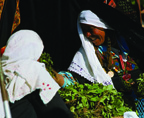The Second Joyful Mystery
The Visitation
By May/June 2009
Return to Table of Contents
Print Article
Solidarity: Mary and Elizabeth nurture new life
“Remember your relative Elizabeth. It is said that she cannot have children, but she herself is now six months pregnant, even though she is very old. For there is nothing that God cannot do.” Luke 1:36-37
“When Elizabeth heard Mary’s greeting, the baby moved within her. Elizabeth was filled with the Holy Spirit and said in a loud voice, ‘You are the most blessed of all women, and blessed is the child you will bear!…Happy are you to believe that the Lord’s message will come true!’” Luke 1:41-45
Reflection
Mary hurries off to the hill country to visit her older cousin Elizabeth. She feels joy and wonderment. Not only is she to bear a son sent by God, but Elizabeth also is to bear a child. Elizabeth, childless for so many years, has suffered the shame of being barren. Now that shame is to be lifted. Mary reflects on Elizabeth’s name, Hebrew for “God is a vow.” Truly what God vowed will come true.
When Mary arrives at Elizabeth’s home, Elizabeth feels the movement of her child in her womb as she greets her cousin. The two women visit with each other and ponder the work of God in their lives. Elizabeth’s son John will grow to be a prophet, one who paves the way for Mary’s son, Jesus. The women imagine what their sons will be like. Elizabeth intuitively knows that Mary’s son is special, extraordinary, the Son of the Creator. She blesses Mary: “Blessed are you among women!” Elizabeth’s words form part of the prayer, Hail Mary. Mary responds with praise of God’s action in her life, proclaiming God “who pulls down the proud and raises the humble.”
We are called to recognize God’s action in our lives. In a sense, we all become pregnant with the living word. We are called to nurture this Word in the womb of our hearts, until it is born in actions of love and compassion. Mary’s visit to Elizabeth shows her solidarity with her cousin. We, too, are called to offer the gift of presence to others. How do I express solidarity with others? Am I willing to accept others’ friendship and their solidarity with me?
Mission Call
Scarboro missionaries spend a lot of time visiting people. Reaching out, going to people’s homes, accepting their hospitality, listening to their lives, are important ways of being in mission. Missioners carry Jesus to that person or family and humbly recognize the presence of Jesus in those we visit. God invites us to nurture this presence in one another, as Mary and Elizabeth did.
Scarboro missionaries also live in solidarity with social groups working to incarnate God’s presence in the world. These groups are many, varying from parish prayer groups and children’s catechetical groups, to rural workers’ unions and indigenous organizations. God calls us to accompany and nurture these groups.
During this decade of the rosary, let us pray that we become more nurturing of God’s presence in one another. Let us remember all women waiting to give birth to new life. Let us pray for groups nurturing peace and justice in the world.
Amazon Word
Roberto and Sara are very poor. Their many children are scrawny. Their house has stick walls and a straw roof. When I am leaving, Roberto presents me with eggs. I feel humbled. How could I take food from them when their children are obviously hungry? But to refuse the gift would be to insult their hospitality. Their generosity overwhelms me.
Return to Table of Contents
Print Article
